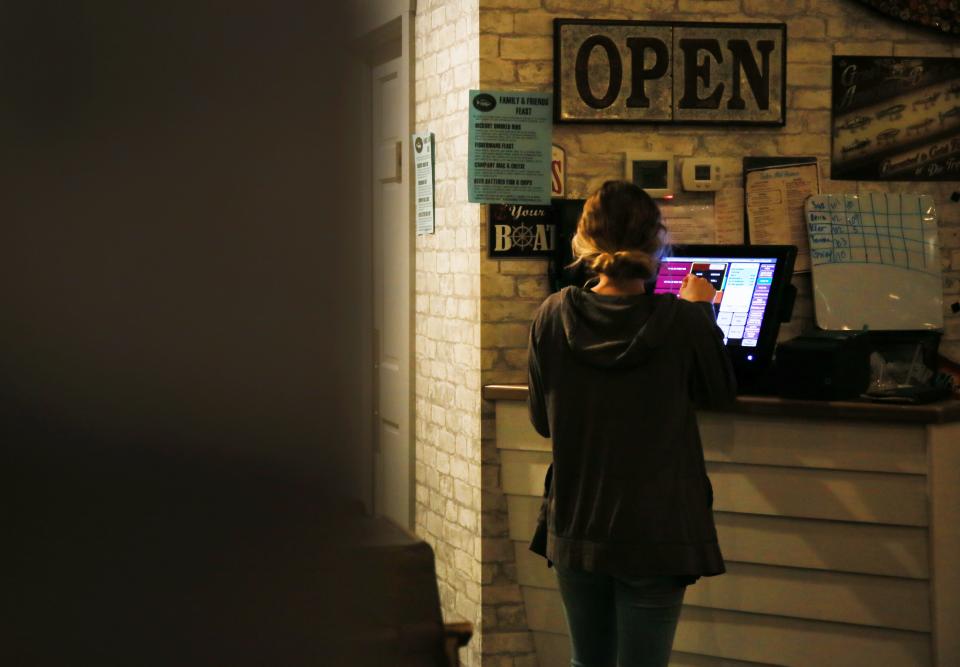Businesses still seeing ‘a little bit of a drag’ from pandemic. Here’s how the local economy has coped.
There’s no single way businesses or the local hiring landscape have been impacted by the COVID-19 pandemic.
In Marine City, as some scale back hours due to a staffing shortage, one popular restaurant hasn’t been feeling the same strain — or rather, they’ve felt it in a different way.
Melissa Fisher, who co-owns the Marine City Fish Company, said although they’ve been lucky, recounting a pride in retaining their staff even after two shutdowns, they still feel a larger shift in culture of employment from the pandemic.
It’s about keeping good, positive morale with employees, she said, and small incentives like pats on the back and extra bonuses for working extra hours, filling shifts, and bringing good attitudes. Business is slower but steady this time of year, she said, and they hope to keep the staff going through spring when they open up garage doors to add another 50 to 60 seats to their layout.

“I feel like people are just kind of waiting for things to get better, and things really aren’t. And it’s kind of been a little bit of a drag where it brings your business down," Fisher said.
“You do whatever you have to do to keep it up, but it just (impacts) the excitement, having a good time and creating an atmosphere, an environment where people want to go out and gather and enjoy themselves. You’ve got people that are working double the hours, or they’re tapping in and tapping out if somebody is getting sick. Just chasing the tail with all of that has been tough, but we’re making due.”
The restaurant, which was also months into an expansion when the pandemic hit, is far from the only business that has had to keep its proverbial head up, bracing for challenges in case COVID-induced slumps return with rules, mandates and shutdowns.

But much of that evidence in St. Clair County is anecdotal.
It’s restaurants posting on social media about temporary closures when staff is out sick, including with COVID, and industrial firms drumming up long-term incentives aimed at recruitment and retention, especially when their wages can’t compete with big factories.
In a message, David Haynes, Port Huron’s planning director, said driving through the city’s industrial park, you can sometimes see signs advertising increased wages, and that there have been calls for signing bonuses and positions posted on billboards “in order to attract new hires.”
It’s indicative of “how competitive the market it is,” he said.
Dan Casey, CEO of the Economic Development Alliance of St. Clair County, said they’ve been tracking unemployment rates and the size of the labor force for a while.
The jobless rate, he said, dropped down to 3.5%, as the labor force slowly increases.
“But it’s still about 3,000 people less than it was prior to the pandemic,” Casey said, “so we’re still playing catchup.”
Limited successes: What economic leaders are seeing across industries
Thelma Castillo, president of the Blue Water Area Chamber of Commerce, also said economic officials are still gauging the ways the pandemic has had an impact.
Restaurants and retail are, indeed, no longer “open the full gamut of hours,” closing in some cases due to supply shortages, as well.
And then, things like vaccine requirements — even house health care or first responder agencies — may also play a role.
“Whether it’s the downtown areas in St. Clair County or whether it’s the mall. The mall’s shutting down at eight o’clock at night. Whoever heard of a mall shutting down at eight o’clock at night?” Castillo said. “But I also know from a chamber perspective, we are starting to look at what chambers of commerce around the state, as well as the country, are doing about the vaccinated mandate policies and cards and how does that impact their events and membership. And we’re in the very, very beginning stages of this. I’ve just started to research.”
Casey said bigger, up-and-coming developments such as Magna Electrical Vehicle Structures, which is building a large facility and opening hundreds of jobs on St. Clair’s old industrial park, are proving to have some of the most recent successes.
He said Magna is “a new player in the market and a really good litmus test” for the availability of labor and the types of wages companies can and can’t pay.
“Magna reports that they’re not having trouble finding people, and they have a lot of jobs to fill. … A lot of their professional staff have been recruited from around the country, so they’re not all necessarily right here in our backyard,” Casey said. “But it’s good to hear they’re not having any problems bringing professionals to the area.”
He added recruiting local production workers didn’t appear to be a challenge either for the company.
Across industries, though, Casey said while they’re seeing bigger employers increase wages, “ultimately, the smaller companies seem to be the ones that pay the price because they have the least ability” to match the pay.
That means they’re forced to get creative, he said, with bonuses and things like transportation gift cards and daycare stipends for workers who stick around.
“We’re seeing some companies do things like walk-in Wednesdays where every Wednesday at a certain time, anybody that’s interested in a job at a particular location can just walk into that office or that facility and apply and get a tour,” Casey said. “Things like that, so those are having some limited success, as well.”
Additionally, Castillo pointed to what she called “a mismatch” of needs versus occasional requisites like the vaccine: While plenty of businesses are looking for people, some on the hunt for the jobs are getting turned down. She said the issue could also be “what the skillsets of these individuals are.”
What else are employers seeing?
Fisher said they’ve also noticed things like the lack of applications for jobs at the fish company versus what rolled in at different points in the past, adding, “It’s almost surprising when you get a couple of apps for the week or the month.”
“It’s definitely not he same from our old hiring process,” she said. “You’d have a folder, have 50 to a hundred applications that you could filter through.”
In St. Clair, where Mark Stevens co-owns two businesses — TAP Café and the Anchor Point Bistro — he said they try to put a premium on employee retention with wages and fostering a good work environment. Between both establishments, they have about 62 employees.
They’re also flexible in scheduling, he said, in a balance that’s kept attrition low.
“We hire the young ones, too. So, we’ve got a bunch of high school kids that can kind of come and go. We’ve worked with their schedule, which I don’t know if some people don’t. But you can say you can work one day a week, and if it’s consistent and you’re good, we’ll take you one day and kind of make it all fit with everybody else,” Stevens said.
He said they still have “a select few” seasoned workers who may look for a guarantee of 40 hours, too, adding, “That’s one thing we try to stick with. If we’ve got to take some of the part-timers out that really don’t care about the extra hours, then we’ll make sure that our primary people at least get those.”
Port Huron City Manager James Freed said the pandemic has impacted businesses across the board in the city, pointing to both the city’s own experience with hires and retention, as well as a few establishments, including downtown, that close days for lack of workers.
“Not one single industry’s not (a little) desperate,” he said. “… I had to give $500 bonuses to all the part-time lawn keepers last summer to stay until after Labor Day.”
Businesses may not be able to meet demands for better wages, Castillo said, especially in comparison to larger areas.
She agreed that locally, they make up for it in different ways.
“And maybe then you don’t have to drive so far to go to work. Maybe as opposed to having to drive down to Detroit,” Castillo said. “Yeah, you make the bigger bucks, but how much time are you wasting on the freeway away from your families, gas and on the car? Sometimes people don’t take that whole thing into consideration. They just say, ‘Oh, I’m making $5 more?’ And what does that mean?”
Contact Jackie Smith at (810) 989-6270 or jssmith@gannett.com. Follow her on Twitter @Jackie20Smith.
This article originally appeared on Port Huron Times Herald: ‘A little bit of a drag’: How the local economy has coped this pandemic.

